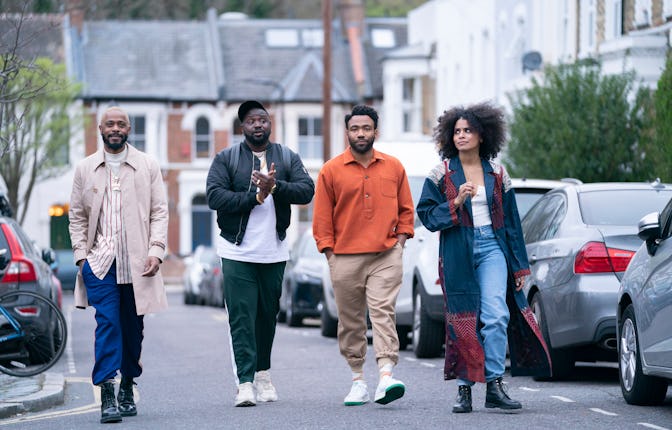What happens when you take the ATL out of Atlanta?
Leaving the titular city has had a discernible impact on the show's original allure.

As of this week, we’re more than halfway through the third season of FX’s Atlanta. So far the latest season of the Donald Glover-created show has alternated between centering the main characters Earn (Glover), Paper Boi (Brian Tyree Henry), Van (Zazie Beetz), and Darius (Lakeith Stanfield) on a European tour, and focusing on a revolving group of new characters. The connective tissue of this season seems to have been laid out in a monologue about “whiteness” that took place during the season premiere last month.
Atlanta works best when the characters use unique cultural aspects of its titular city to comment on American society, especially race and class, at large. Season 3 has featured some of those moments, most notably in the opener “Three Slaps” and this week’s “White Fashion” episodes. In the latter, Paper Boi navigates his role as an activist and spokesperson for Black people, quickly learning that sometimes having a seat at the table makes you more of a pawn than a person who can actually effect change. (The inclusion of a queer activist and a racially ambiguous one had Black Twitter laughingly comparing the characters to Deray McKesson and Shaun King, two well-known activists who have had various criticisms lobbed their way.)
Still, some moments in this season have felt more like it’s talking to white people about whiteness, as opposed to providing insight into the ways we (i.e. Black people) experience this whiteness. Much of this might have to do with framing and tone. “Three Slaps,” for instance, is told from the perspective of a Black boy who is sent to live with racially insensitive white mothers, while “The Big Payback” is told through the lens of a white man scared to lose everything as a result of a Black descendant aggressively demanding reparations. The episode is intended to be an exaggerated, near-parody look into reparations, but centering the episode around the white lead’s anxiety just feels misguided. It’s funny in the sense that many white people likely do think reparations would have an outsized impact on their individual standings and wealth. But, couldn't the show have gotten at this misguided anxiety while centering the Black woman seeking reparations? Instead, she comes off more as a caricature – filming a helpless white man for social media and plotting to take his home so that she could host a BBQ in the parking lot – instead of a fully realized character.
Alternatively, when we had Loquareeous as a guide through the microaggressions that can often impact kids who are taught or raised by white people in “Three Slaps,” we were still able to see that he was viewed inhumanely without decentering his experience. When exploring the vast impact of “whiteness,” framing matters.
When the first trailer for Atlanta was released, before the season 1 premiere in Nov. 2016, I was extremely skeptical. The 30-second advertisement showed Donald Glover, the show’s creator, and his co-stars Brian Tyree Henry and Lakeith Stanfield strolling down a street to the tune of Tame Impala’s “New Person, Same Old Mistakes.” As they moved forward together, everything else around them – the cars and the people – moved in reverse.
There was little insight into the show’s storyline and, if I’m being honest, I wasn’t quite convinced of Glover’s ability to portray the city of Atlanta. Glover, I thought, was from the suburbs (Stone Mountain) and he was hardly the first person that most people thought about when it came to local rappers who put their hometown on the map. Despite sharing our culture with much of the world, Atlantans can be protective of the city’s image. I was/am not exempt from this.
The first season of Atlanta quickly shut me up. The opening season was a witty look at two cousins and their quirky friend trying to find their place (and establish careers) in the city. It was funny. And, it was undisputedly very Atlanta. From the start, the show’s writers, which include both Donald and his brother Stephen Glover, as well as Marietta-raised Stefani Robinson and others, showed the unique aspects of Atlanta’s culture without falling into the trope that there’s only a singular way to exist as a Black person here.
In the first two seasons, the show highlighted wing culture, featured a cameo from Migos, showcased the complex relationships between the Black working class and bougie elites, and reminded everyone of the racial dynamics that exist outside of metro Atlanta. When I attended the season 2 premiere for the series in 2018, Henry talked with me about this. “When you think you have Atlanta pegged, you [still] don’t know shit about Atlanta. That’s the great thing [about the city]. Every corner, every nook and cranny has something different to discover,” he said. While giving us a peek into the southern Black hub, Atlanta also reminded us of the ubiquitous nature of Black American culture.
In previous seasons each episode features the characters experiencing a different dilemma, but the series has remained cohesive thanks to a common thread: Atlanta. With the main characters overseas and the city of Atlanta no longer serving as the glue holding the episodic moments together, the first half of season three has felt a bit uneven.
As a city, Atlanta has changed a lot since the FX series first aired in 2016. With the show ending later this year with its fourth season, it’d be great to see the show return to mining one of America’s most unequal cities for content again.